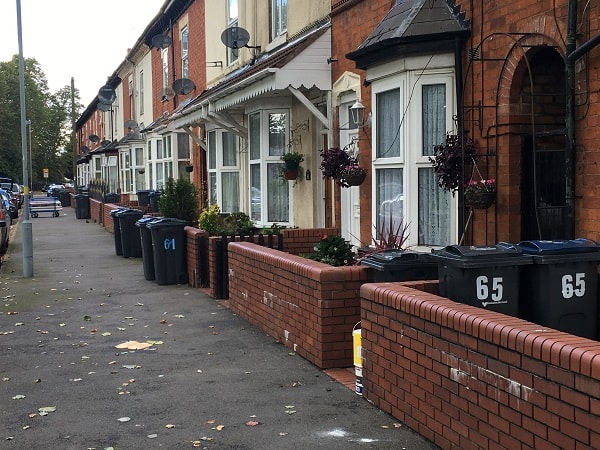Local authorities are increasingly seeking innovative ways to improving the efficiency and performance of their waste management services whilst at the same time reducing costs and facing the differing challenges of:
- Brexit & the EU Circular Economy Package
- Challenging markets for recyclate and in particular the impact of National Sword
- Growing public interest (the Attenborough effect – Ocean Plastics)
- Austerity and the ongoing reductions in public sector funding.
There may be a wealth of information available to local government to learn from each other and support their ambitions to deliver innovative services, including case studies, examples of good practice and a host of other publicly available resources. However, little of it is held in any one place or co-ordinated by either topic or relevance.
Birmingham
Ricardo’s report Waste Treatment Technology Foresighting – Recycling and Recovery Technology Solutions for Birmingham City Council [1] addressed this problem by considering both established and emerging recycling and recovery technologies in the following categories:
- Recycling technologies and systems;
- Thermal treatment of waste, including advanced thermal treatment (ATT); and
- Biological treatment, including mechanical biological treatment (MBT)
The overall aim of the report was to enable Birmingham City Council to be an informed customer in the future procurement of a waste management contract/s, and to provide the council with the technical information and necessary evidence base to aid future decision making.

Procurement offers a wealth of opportunities to deliver innovation. The procurement regulations now encourage more competitive dialogue, which can be very effective, when appropriately applied, in delivering custom-made solutions. The Innovative Partnership procurement procedure, written into the 2015 Public Contract Regulations, actually aims to develop ‘an innovative product, service or works’ and to subsequently purchase ‘the resulting supplies, services or works’ (provided that they correspond to the performance levels and maximum costs agreed between the contracting authority and the participants). However, initiatives to improve procurement must embrace all facets of the procedures, including the ‘light touch’ regime, and not just the new and more complex tools that are now available.
Service Improvement
Innovation shouldn’t stop once a contract has been awarded. Contracts should encourage bidders to seek continuous improvements and innovations throughout the contract term, and as the Services evolve. One way of achieving this is to specify an Annual Service Improvement Plan (ASIP) The overall objective of the ASIP is to address how future improvements to the Service can be made. The ASIP should reflect the Contractor’s performance over the previous twelve months and outline the future approach to any changes to a Local Authorities’ corporate and environmental policies and strategies and any changes to the Contractor’s staffing or management structure arrangements. The aim should be to improve the way the Service is delivered, having regard to a combination of economy, efficiency and effectiveness.
The invention and adoption of technologies continues to transform our world at a fast pace – it is integrated into almost everything we do in our everyday lives and waste management is subject to the same speed of change as other industries.

City of London
Low emission technology refers to vehicles that are electric, hybrid, propane, gas, hydrogen or air powered. The City of London, are trialling Electra, the UK’s first fully electric refuse truck as part of an initiative to drive down air pollution. There are further developments underway in vehicle development, such as the fully autonomous road sweeper which could revolutionise City centre sweeping and it doesn’t stop there; trials have even been undertaken on an autonomous refuse vehicle. [3]
There is also continuous innovation in the way local authorities are collecting and using data. Systems which provide data through a connected network of sensors enable local authorities to track and monitor activities such as compactor fullness, refuse/ recycling collection routes and previous collection data. Bins equipped with fill-level sensors allow the quantity of material in each container to be identified. By utilising this information, collection routes can be planned around the bins that are near-capacity and need collection, reducing travel times, fuel and costs which could provide much needed savings for local authorities.
Technology
Technology is also providing new ways of changing behaviours. The University of Winchester wanted to keep the campus clean of gum litter and adopted a twin-pronged strategy to tackle the problem. It installed bins made of recycled chewing gum. A message next to the bins explained that any gum collected would be recycled into new objects, and hundreds of coffee cups made of recycled gum were given out to first-year students. The success of the project has resulted in the university expanding the scheme, based on a noticeable drop in gum litter.
Commercialisation
However, it is not only technology that can result in innovation; areas such as Commercialisation, basically income generation or, at least, a return on investment, has led to new ways of working for local authorities. Commercialisation can take a number of forms; it’s not just about selling services and materials but sharing services with other local authorities, establishing partnerships with commercial organisations, or council’s setting up independent, autonomous profit-making companies.
There is no doubt that commercialisation, despite being subject to a complex set of statutes, regulation and economic limitations, can increase income generation and insource third party spend in a way that not only offsets continued budget cuts and protects front line services but also enhances social value through increasing employment opportunities and ensuring the wider use of assets.

Local authorities can play a major role in supporting innovation in waste management. In order to do so, however, the attitudes and wider culture of risk aversion will have to be overcome if they are not to become a barrier to innovation. Public sector procurement can play an important role, but to do so there is a need to:
- Embed innovation into decision making from the start of the commissioning cycle.
- Undertake frequent mapping of existing technology and potential new developments.
- Involve suppliers early in the process and encourage ideas to exploit new technologies.
References
[1] https://www.birminghambeheard.org.uk/place/from-waste-to-resource/supporting_documents/ED61680%20BCC%20Technology%20Foresighting%20FINAL1.pdf
[2] Organizational Innovation. I: Fagerberg, J., Mowery, D.C., Nelson, R.R. (red.). The Oxford Handbook of Innovation. (p.115-147). Oxford: Oxford University Press).
[3] http://www.volvogroup.com/en-en/news/2017/may/news-2561936.html
AUTHOR
Brian Mayne is part of the Resource Efficiency team at Ricardo Energy & Environment. He is a fellow of the Chartered Institution of Wastes Management and a Chartered Environmentalist. Brian is responsible for project direction and management, business development and technical delivery across a range of resource efficiency areas for Ricardo Energy & Environment. He has a background in strategy policy and operational management at a senior level within local government and has delivered a range of award-winning sustainable procurement projects for waste management services and infrastructure








Subscribe for free